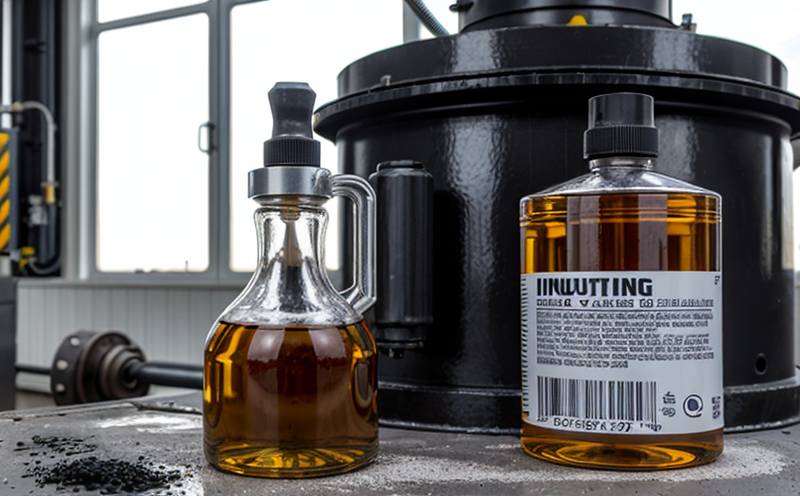GB T 3555 Flash Point Testing of Oils
The GB T 3555 standard specifies the procedure for determining the flash point of petroleum products and their fractions by means of an open cup apparatus. This method is widely used in the chemical testing industry to ensure safety standards are met, particularly for industrial oils and additives where flammability characteristics are critical.
The flash point test aims to determine the lowest temperature at which a liquid can give off enough vapor to ignite with an ignition source. Understanding this characteristic helps in assessing the fire risk associated with storage, handling, and processing of these products. The testing procedure is essential for quality assurance programs, safety regulations, and compliance with international standards.
The test is conducted using an open cup device that exposes the sample to a flame while monitoring the temperature at which the vapor ignites. This process requires precise control over environmental factors such as temperature and air flow. Proper specimen preparation involves ensuring consistent sample volumes and purity to ensure accurate results.
At Eurolab, we employ advanced testing equipment compliant with ISO, ASTM, and EN standards. Our team of experts ensures that every test adheres to the strictest quality control measures, providing reliable data you can trust.
The results from GB T 3555 testing are critical in various applications, including the formulation of lubricants and hydraulic fluids. For instance, in the development of new industrial oil formulations, the flash point is a key parameter that influences both performance and safety. Understanding this characteristic helps in optimizing the balance between stability and efficiency.
Furthermore, compliance with such standards ensures regulatory adherence, which is essential for maintaining a competitive edge in the market. By understanding and adhering to these guidelines, companies can avoid potential legal issues and enhance their reputation as leaders in quality and safety.
Why It Matters
The flash point test results are crucial not only for compliance but also for the safe handling of industrial oils and additives. By conducting these tests, manufacturers can ensure that their products meet stringent safety standards set by regulatory bodies.
The flash point is a critical factor in determining the flammability risk associated with oil and additive storage areas. This knowledge helps companies implement appropriate safety measures to prevent accidents and potential explosions. Understanding this characteristic also aids in designing safer workplaces, reducing insurance premiums, and enhancing corporate social responsibility.
In addition to safety considerations, flash point testing plays a vital role in the quality assurance process. It ensures that products meet specific performance criteria set by manufacturers or buyers. This can lead to improved product reliability, increased customer satisfaction, and enhanced brand reputation.
For procurement teams, knowing the flash point of industrial oils is essential for selecting high-quality suppliers who adhere to stringent testing protocols. This allows them to source materials that not only meet regulatory requirements but also perform optimally in various applications.
Applied Standards
| Standard | Description |
|---|---|
| GB T 3555 | Procedure for determining the flash point of petroleum products and their fractions by means of an open cup apparatus. |
| ISO 1835:2004 | Standard specifies a method for determination of flash point by means of the closed-cup apparatus. |
| ASTM D93-17a | American standard that covers determination of flash or fire point of petroleum products. |
| EN ISO 1835:2004 | European adaptation of the international standard for determining flash point by means of a closed-cup apparatus. |
| Equipment | Description |
|---|---|
| Open Cup Flash Point Tester | An apparatus used to determine the flash point of petroleum products and their fractions by means of an open cup. |
| Flame Source | A device that provides a controlled flame for testing purposes. |
| Temperature Control System | A system that ensures accurate temperature measurement during the test. |
| Safety Interlocks | Devices that prevent the apparatus from operating under unsafe conditions. |
Eurolab Advantages
At Eurolab, our commitment to excellence in chemical testing is reflected in every service we offer. Our expertise lies in providing accurate and reliable flash point tests for industrial oils and additives that comply with GB T 3555. We leverage state-of-the-art equipment and a team of highly skilled professionals to ensure that each test meets the highest quality standards.
Our services are tailored to meet your specific needs, whether you require routine testing or one-off assessments. Our advanced facilities allow us to conduct tests under controlled conditions, ensuring consistent and accurate results. Whether for compliance purposes or quality assurance, Eurolab is your partner in ensuring product safety and reliability.
We offer a range of additional services that complement our flash point testing capabilities. These include chemical analysis, environmental testing, and materials testing, among others. Our comprehensive approach allows us to provide integrated solutions that meet all your testing requirements.





